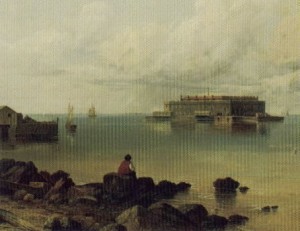A trunk with a hidden compartment, international intrigue, … the “Pathfinder of the Seas”???
No. I spent time the past three blogging days on a wild goose chase. I do not think the M.F. in this story is the famous oceanographer who joined up with the CSA at the outbreak of the war, but I think he is certainly related to the family in this story.
From The New-York Times November 10, 1861:
DISCOVERY OF TREASONABLE CORRESPONDENCE.
From the Cleveland Herald, Nov. 5.
In the early part of the week, U.S. Inspector IVES seized a trunk going South, with its owner, Mr. RUTSON MAURY, which on examination was found to contain seventy-nine letters from foreign countries to different parties in the South. These letters were secreted among the clothing and some in the “pocket” of the trunk.
Later in the week another trunk, belonging to [M.?] F. MAURY, brother of RUTSON MAURY, also containing a number of letters carefully stowed away to elude detection, was seized. Both trunks were placed in the possesion of the U.S. Marshal.
RUTSON MAURY was very solicitous to get possession of his trunk, professing indifference as to the fate of the letters, but the authorities here were inexorable. MAURY then started for Washington to prevail upon Secretary CHASE to issue an order for the delivery of the trunk, representing that it only contained the wearing apparel of himself and wife, and that the letters having been removed, there were no contraband articles in it. Yesterday Marshal BILL received an official letter inquiring into the circumstances of the case.
Such extreme anxiety to get possession of a trunk, the contents of which would not amount to the expense of the owner’s journey to Washington and back to obtain it, aroused the suspicion of the Marshal that there was more in it than he had yet discovered. The liberal use of a penknife at last revealed the existence of a large pocket, skillfully concealed in the substance of the trunk, and hid by pasting a false lining over it In this pocket were two hundred and fifteen letters, addressed to various parties in the Southern States. Of these two were for Eastern Virginia, eighteen for Alabama, thirteen for Texas, one for South Carolina, and the remainder for New-Orleans. These letters were from different places in France, England and South America. Two of the letters were from Rio Janeiro.
A memorandum among the letters, addressed to JAMES MAURY, New-Orleans, says that “M.F. MAURY will be in New-Orleans on the 8th of November and leave on the 11th. You understand.” From this and other memoranda, it is evident that JAMES MAURY is connected in some important official character with the New-Orleans Post-office, and that M.F. and R. MAURY are traveling agents of the rebel Post-office Department, whose business is to gather the letters at New-York or other points, and smuggle them through to the South. Many of the letters hurt [have?] been consigned to the care of parties in New-York, where names have been carefully cut out. There is also [???] that packages of letters are sent to parties in New-York, and then redirected to their destinations.
The seizure of the letters carried by these two men are of great importance. It is to be hoped that the traitors will be arrested.
I think that Matthew Fontaine Maury is related to James and Ruston Maury based on evidence at William & Mary’s Swem Library here and here. It seems that the famous Matthew Fontaine is Rutson’s cousin. The M.F. in this story must have been named after the ex-U.S. naval officer and oceanographer, who did spend time abroad during the Civil war.
By November 19, 1861 it appears that both Rutson and M.F. had been detained. There is evidence that on November 2, 1861 the authorities in Cleveland seized M.F. Maury’s trunk containing between 600 and 700 letters for the South. By the 19th Ruston was detained at Fort Layafette.
***The image of the knife is from WP Clipart.



Pingback: A Little Less Liberty in Liverpool | Blue Gray Review